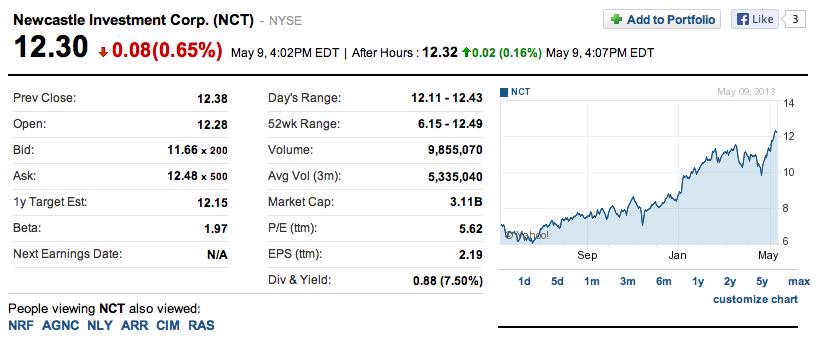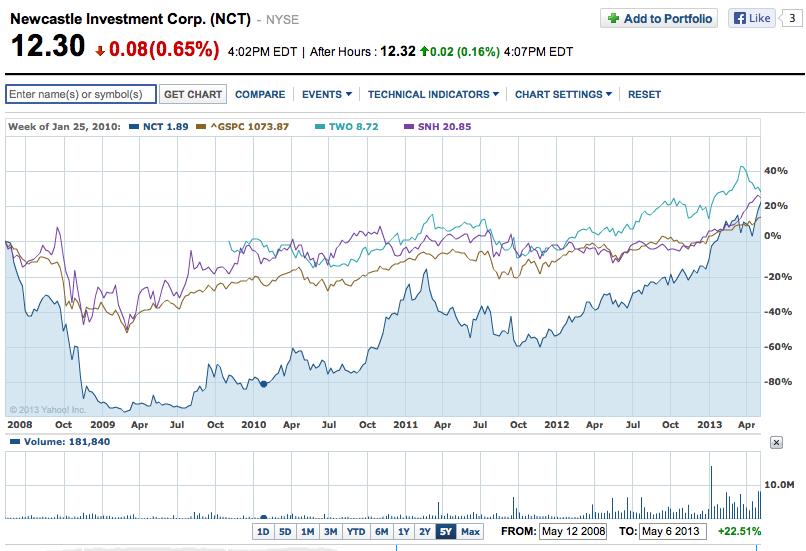We have already established that Aristotelian thought did not anticipate the power of corporate spinoffs (see “Aristotle Did Not Anticipate Spinoffs”). In this offering, we will alert you to another interesting spinoff that is already in process. This particular demerger is intriguing because of the intricate web of partnering corporations whose synergies within their respective areas of expertise have resulted in such an impressive explosion of growth that Newcastle Investment Corporation (NCT) is in the process this month of spinning off its relatively newly developed residential mortgage/investment segment into a segregated corporation: New Residential Investment Corporation (NRZ).
The story begins with Fortress Investment Group LLC (FIG), a large asset management company started in 1998 by a former Black Rock partner and two managing directors at UBS. Between 1999 and 2006, its private equity funds had netted growth of almost 40%. FIG entered into several financial asset management business segments, including hedge funds – becoming the first private equity hedge fund manager to launch an IPO, in 2007. By 2010, FIG had almost $42 billion assets under management.
In 2002, during its first years of burgeoning growth, FIG launched an IPO for Newcastle Investment Corporation (NCT), with the intention that NCT would serve as one of its alternative investment vehicles – specializing in “opportunistic” investment in and management of commercial real estate assets. It became organized as a REIT for income tax purposes – thereby throwing off significant income to investors. From the start, NCT was managed by a dedicated affiliate of FIG.
In recent years, two developments have occurred which could not have been anticipated in the early years of NCT: 1) About one year ago, “opportunistic” investing brought it into the senior housing industry – focusing upon two of the three primary senior housing product categories (independent living and assisted living); and 2) Through its relationship with FEG-owned Nationstar Mortgage Holdings (NSM), the largest nonbank servicer of residential loans, NCT has been able to invest in excess “Mortgage Servicing Rights” (MSRs) on extremely favorable terms, as well as “Residential Mortgage Backed Securities” (RMBS). Newcastle has discovered that both areas are extremely profitable, and therefore very appealing, long-term businesses.
As management disclosed in its May 3rd earnings conference call (http://phx.corporate-ir.net/phoenix.zhtml?c=132209&p=irol-irhome) senior housing is buttressed by an extremely favorable supply/demand imbalance. Looking forward, the senior citizen population is projected to grow 3-4 times faster than the general population, and yet viable housing options for them is at record lows. Adding to the “opportunity”, the industry is currently highly fragmented. The market has $300 billion in senior living assets in the U.S. – and 70% of these assets are owned by entities or individuals owning less than 15 properties.
NCT boasts a significant competitive advantage within this business – an exceptional Portland-based senior living property management firm recently acquired by Fortress. That firm empowers NCT to identify small portfolios of senior living assets that offer the potential for operational efficiencies and enhancements through which to drive organic growth (rationalizing expense, increasing rates, growing occupancy levels).
Management has been targeting assets currently exhibiting returns in the low teens, with the expectation that it can leverage growth up to the 20% level. They report an existing “pipeline” of such assets that approximates $1 billion, and they are understandably excited about this new business segment.
With regard to the other segment of new growth – springing from the residential mortgage arena – management highlighted its enthusiastic expectations regarding that business segment during its May 3rd conference call. Currently, the U.S. MSR market totals about $10 trillion – of which big banks have owned, for many years, anywhere between 90-93% of that asset class.[1] It is well known that the banking industry faces a significant period of restructuring due to the requirements of Dodd/Frank regulation and the capital requirements related to the international Basel III standards. Consequently, banks have been under pressure to downsize their MSR exposure. Over the past two years, in fact, banks have unloaded $365 billion in MSR assets, and an additional amount (estimated at $700 billion is currently being offered. As the largest non-bank mortgage servicer, Northstar is the major player in absorbing these “excess” MSRs [2]; and the asset management experience within NCT is central to a systemic maximization of these assets for the benefit of shareholders. Management expects returns in the high teens.
Coincident with the emergence of these growth areas for NCT are the addition of non-agency RMBS assets and a portfolio of consumer loans from HSBC – both of which offer very attractive returns (albeit not quite as profitable as the returns for senior living and MSR assets). In the estimation of management, the non-agency RMBS business holds special appeal. NCT executives have examined a large quantity of the residential loans that serve as collateral for non-agency RMBS securities. That analysis establishes that many, if not most, of those loans are more valuable than the securities – making the non-agency RMBS business potentially quite lucrative.
By early 2013, these new business segments within NCT had (per the conference call report) grown to a size roughly comparable to the size of NCT’s long-time, more traditional commercial real estate operations – the business lines that had served as its “bread and butter” since 2002 (when FIG founded it).
The bottom line is that the emergence of these exciting opportunities within the expanding operational life of NCT has taken NCT to a corporate crossroads: how can it most effectively foster the growth of these new businesses, while simultaneously managing its traditional business, when the investment market places quite divergent “value” and “risk” characteristics upon the various components of NCT’s expanded business lines?
NCT arrived at the “answer” which we now see unfolding before us. The spinoff of New Residential (NZR) from Newcastle creates (in the words of Corporate Board Chairman, Wes Edens): “two distinct companies, both with distinct strategies. It should bring a lot of transparency to it.” Thus far, the market has “applauded” this corporate strategy – pushing NCT’s stock price up about 30% since the spinoff decision was reported. Once again quoting from Edens: “We still think that once the numbers become very clear and the transparency is there, that we’ve got a good deal of upside from here.” It is quite significant that management has been “putting its money where its mouth is”. Reports have shown significant amounts of “insider buying”. In fact, TSR Spinoff Analysis reported in late March that two company officers invested approximately $1 million each during recent months. In addition, TSR reported that the top ten shareholders own almost 15% of the shares outstanding.
At this point I imagine that you are intrigued by the NCT spinoff story and are anxious to see more details about the demerger timeline, as well as more specifics about the companies as they will operate following the spinoff:
1) Although “when issued” shares of NRZ have been trading already, the actual distribution of shares to NCT owners will be made on May 15th to those who were shareholders of record as of 5:00 PM EDT on the “record date” (May 6th).
2) Each person who owned NCT on May 6th will receive one share of NRZ for each owned share of NCT.
3) During the past two months, the following firms have raised the “target price” for NCT (pre- spinoff)—
- Credit Suisse raised target from $11.50 to $12
- KBW raised target from $10.50 to $11.25
- UBS AG raised their target to $14.
4) As NCT CEO Kenneth Riis announced the spinoff, he commented: “We believe the separation of Newcastle and New Residential will optimize corporate transparency and create value for each standalone company.”
5) Management further builds its case for the spinoff by assuring analysts that each company is sizable enough to profitably stand alone with its share of current Newcastle assets. In addition, they assert that there is a more than adequate pipeline of new asset opportunities for each business.
6) As of May 6th, NCT’s data points included the following –
- 52-week low and high: $6.15 and $12.09
- Market Cap is just over $3 billion
- P/E Ratio is 5.45.
POST SPINOFF:
NCT will focus upon commercial real estate loans and senior living assets. These assets are generally perceived as more traditional and stable.
According to the March 25th TSR Spinoff Analysis, the projected annual return of NCT is 12-15%. Projected dividend is 8%. Target price is $6.25
NRZ will focus on strong risk-adjusted returns through investments in excess MSRs, RMBS, non-performing consumer loans, and Mortgage Servicing Advances. TSR projects that excess MSRs and non-agency RMBS could generate returns between 15-20% with moderate to no leverage. These assets have been perceived as higher risk, but with comparably higher reward.
TSR projects an annual return for NRZ ranging between 15 and 20%. Projected dividend is 9%. Target price is $6.22
By now I am confident that you fully understand how and why this spinoff “unlocks shareholder value”. It splits the recently expanded and diversified Newcastle and into two easily identifiable and differentiated corporations.
NCT will be more appealing to conservative investors while NRZ will likely be more appealing to investors with a higher tolerance for risk.
The standard wisdom of Wall Street is that if NCT had remained in its pre-spinoff state, conservative investors would be less enthused about the stock, thereby valuing it at a lower price in order to compensate for higher risk. Likewise, more risk tolerant investors would likely find the stock less attractive because of the lower relative return from commercial real estate assets. Therefore, they would likely place a lower value on the stock as well.
As NCT’s Board Chair and CEO each attested to separately, the spinoff is intended to enable investors and institutions to more easily and transparently place a “fair value” upon NCT and NRZ. So here we have uncovered one more case that illustrates the weakness within Aristotle’s famous tenet (once again, found in “Aristotle Did Not Anticipate Spinoffs”)! Even Aristotle would have to concur that, in this case, the sum of the various parts is (very clearly) greater than the whole.
DISCLOSURE TO READERS: Nothing in the above is intended as a recommendation to buy or sell any security. Investing and trading involve risk, so you should consult with your financial advisor to clarify your investment goals and risk tolerance. The author does not own either NCT or NRZ but is now intrigued by both.
CREDIT: All of the corporate charts appearing here were used in the NCT shareholder informational presentation on May 5th. http://phx.corporate-ir.net/phoenix.zhtml?c=132209&p=irol-irhome
The price graphs below were created in Yahoo Finance by the author.
The graph below shows the price over the past two years of NCT as compared to the price of the S&P 500 Index, Annaly Capital Mgt, and Arbor Capital Trust.
The graph below comes from the “SUMMARY” section of NCT’s information as presented within Yahoo Finance.
The graph below contrasts the price trends of NCT, Two Harbors, Senior Housing Properties Trust, and the S&P 500 Index.
[2] Fortress owned Northstar Mortgage Holdings (NSM) acquired billions of dollars worth of MSR (and other) assets from Bank of America (BAC) through a major settlement agreement between NSM and Fannie Mae.
Submitted by Thomas Petty
Related Posts
Also on Market Tamer…
Follow Us on Facebook



 AMD: Solid Execution and AI Ambitions — but Can It Catch Nvidia?
AMD: Solid Execution and AI Ambitions — but Can It Catch Nvidia?



